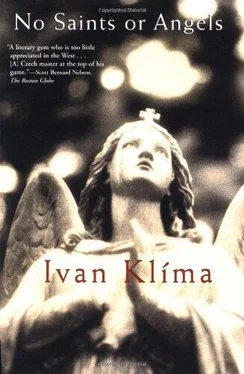I reached the kitchen and turned on the hot tap. The vase
slowly filled and the water in it really was blue and gave off steam.
Then there was an odd sound that I'd never heard before: the
sound of glass cracking. The vase broke in two in my arms. I can
still recall the terror I felt as I tried — in vain, of course — to put the
vase back together again.
First Dad interrogated me. Why had I taken the vase down? What was I intending to do with it? Why had I put hot water in it? Was I aware of the damage I'd done?
Then he gave me a good hiding. I screamed and promised to buy him a new vase when I was big; I'd buy him two beautiful vases.
When I started to earn money of my own I actually did do the rounds of a few antique shops until I eventually found a vase of a similar colour, at least, to the one I'd broken long before. But it had the image of a flying bird etched into its side, instead of a nymph.
I gave Dad the vase as a Christmas present. I got a ticking off. 'You're crazy. What am I supposed to do with a vase? Have you ever seen me buying flowers?' He'd long ago forgotten about the
broken vase. It hadn't interested him and he hadn't regretted it; he had just thought it right to let me know what a dreadful thing I'd done.
I leaf through the notebooks from the end of the fifties and am unable to find any reference to the vase. Either there isn't one, or I missed it. On the other hand I notice that some female Comrade W crops up repeatedly in his notes. It's probably the same person who is later referred to as W. Saw V. Talked to V. about flowers for International Women's Day. . We went to see Ballad of a Soldier. W. cried. . Repaired W.'s sewing machine. No more details. He was careful. He was well aware that what he wrote down could be used against him. Even so, I feel as if I'm prying as I read it. I ought to put the notebooks back in the box. Dad's dead; why do I need to know about his secrets and his sins?
Eventually I drop off to sleep for a while.
3
Outside, it's a fine May morning; it looks as if everything has burst into bloom. I rejoice in the scents that waft into my room from the nearby gardens. But I expect hayfever sufferers are desperate; my daughter also was complaining of sore eyes when she woke up this morning.
She's back at school. She took a maths test and got an E again. I asked her if she realized she'd fail. She said she did.
She wouldn't be earning her living from maths!
I asked her to kindly tell me what she'd be earning her living from. She didn't think she'd be living off me for the rest of her life, did she?
I wasn't to worry, she'd get by somehow. And probably a lot better than I had!
She's insolent, but what can I say in reply, seeing how badly I've coped with my own life? I tried to explain to her that if she didn't
manage to pass her leaving exam, at least, the best she could hope from life was to be a shop assistant or a hairdresser.
She told me defiantly that she'd happily train to be a hairdresser. It was her life, and it wasn't for me to worry about.
When I was sitting in the metro, two girls of Jana's age were standing opposite me. They struck me as being clean inside and out: no war paint, no rings in their noses or even their ears. Why can't mine look like them?
I'm tired from lack of sleep. Luckily I've only a short surgery today and when it's fine, like today, people don't feel like going to the dentist and I can have a doze from time to time in the X-ray room.
I can't go home after work anyway; I have to go to the stonemason's to order an inscription for the gravestone and buy an urn for Dad's ashes. Then I have to arrange at the cemetery office for their interment. All the beneficiaries have been summoned to the notary public next week so that he can share among us what Dad left. It's a pointless operation as all that remained are a few old clothes — including his People's Militia uniform — a bed and a box of his writings. As well as a portrait of Lenin, the great leader of the proletariat. My sister has to attend at the notary's too. Even though she won't deal with anything else, she'll be there to see the urn buried, so long as I sort everything out first.
Once, when my sister was sixteen, she came home from somewhere in an odd state. Nowadays I'd say she was high, but drugs were a rarity at that time, so she was probably just drunk. She donned the long, lacy dress she wore to dance classes and put on my Cream record with that long, impeccable drum solo. It was really sultry music and I'd made love to it several times. If I'd put the record on, Dad would definitely have protested, as it hadn't been vetted as politically correct. But he let my sister do what she liked because she was so frail and sickly. So she put on that sultry music and started squirming to it. It wasn't a dance, more of an ecstatic trance in which she started to prophesy our futures,
including the way we'd all die. Dad would die of cancer and Mum from a painless stroke. I was supposed to die by my own hand.
'How?' I asked in astonishment.
'By your own hand,' she repeated. 'That's all I know. But it will be bloodless. I see you lying there pale and beautiful, as if covered in hoarfrost. Maybe you're frozen. But you're lying on something green. Maybe it's a lawn or maybe just a carpet.'
'And what about you?' It struck me. 'You won't say anything about yourself?'
'I don't know. Prophetesses aren't able to prophesy about themselves. Maybe I'll never die.' She laughed.
Our parents were dumbfounded and said nothing. I told her she was drunk and embarrassing, but stopped short of telling her she was callous to everyone but herself.
Dad died of lung cancer. Mum's still alive but the doctors are hard-pressed to keep her blood pressure slighdy above normal. My sister, as she imagines, will never die and while I've considered suicide — self-extraction — on a couple of occasions, I've never had the determination to go through with it.
I don't feel like going to the stonemason's, the cemetery office or the notary. I hate dealing with officials, with anyone, in fact, who sits at a counter or behind a typewriter. Men should deal with arrangements: they're not reduced to tears by churlish petty bureaucrats. The most that women should take care of is shopping; but I'm a defective woman, I don't even like shopping. I hate supermarkets, where they offer me an alternative lifestyle full of junk and try to convince me with the help of sickly music that it's all I need for happiness. I dash through shops, toss the absolute minimum of things I need into a basket, and then flee. I choose shoes from window displays and either they suit me or I leave. The same goes for clothes. When they lure me with hundreds of garish outfits I have the feeling I'm looking at rows of people hanging from gallows. They hang there headless, as if their heads have been removed so as not to get in the way, because heads are totally
out of place in that particular world. Those gallows give me the horrors, and as usual I make myself scarce.
I don't have a husband; possibly I have a lover. When he last called, he asked me how I was fixed at the end of the week. I told him I'd probably be devoting myself to my daughter. He told me excitedly that he would be going to Brno to attend a seminar and was just finishing the paper he would deliver.
I asked him what it was about.
He said it was an attempt to explain how and why people subordinated themselves to criminals. He is proud to be delivering a paper. It bothers him that he didn't complete university and sometimes it strikes me that it's one reason he's attracted to me: being able to make love to a doctor. As if it particularly matters how many years one spends acquiring knowledge, which is mostly pointless.
Читать дальше












